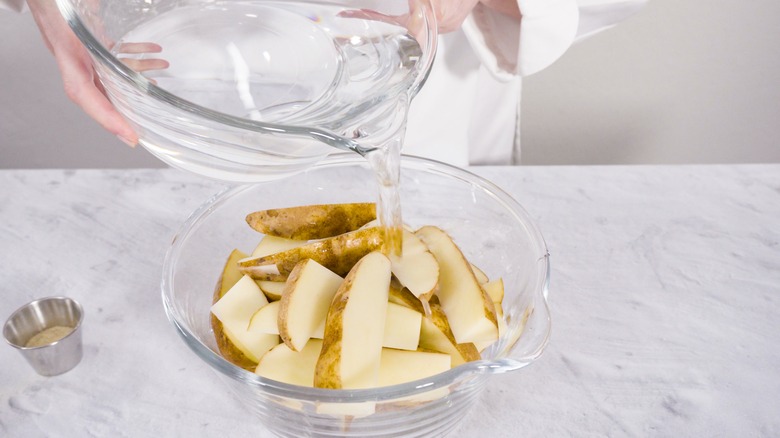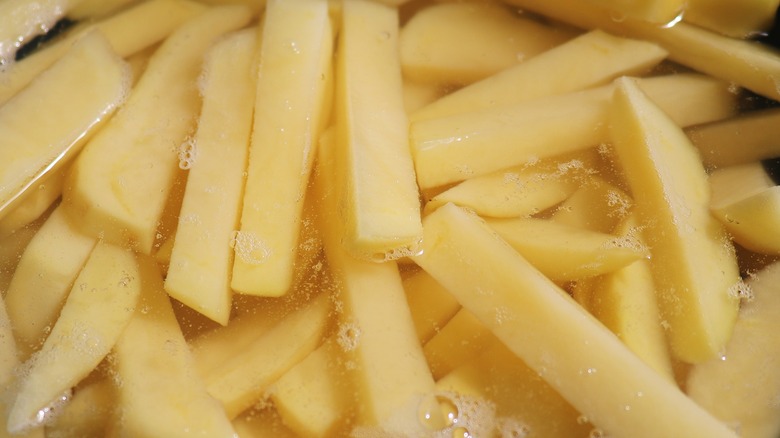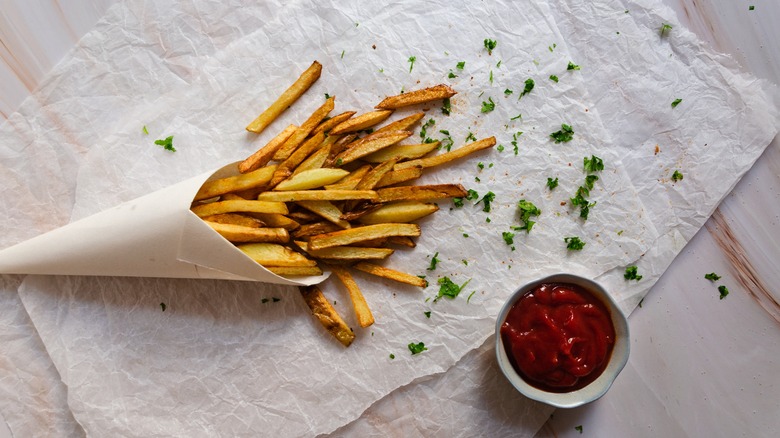How Long To Soak Potatoes For The Crispiest Possible Fries
It's hard to name a food more widely beloved than the humble potato. From mashed potatoes to hash browns to the classic fry, America just can't get enough of them. Potatoes have been part of the American diet since the early days of America, and part of Indigenous diets long before that. Today, the average American consumes an impressive 120 pounds of them per year.
Whether you prefer yours curly, steak cut, super thin, or waffle shape, we can all agree the perfect fry is salty and crisp. When making fries at home, which is more doable than you might think even without a deep fryer (hello baked fries, air fryer fries, the possibilities are endless!) there's a simple hack to ensure the ideal crispiness level, no matter how you're slicing, dicing, and cooking your potatoes. It all comes down to simple H20! Before you bake or fry your spuds, a dunk in regular old tap water is a game-changing step that helps draw out excess starch, creating a firmer, less moisture-packed fry that is crunchier and crispier with each bite.
Just a quick 15-30 minute soak in water does the trick if you're in a rush, though if you are planning ahead you can let the sliced russets or yes, even sweet potatoes, bathe for hours or even overnight before draining, drying, and frying them up.
Water works via osmosis to draw out extra moisture before frying
Of course you can always just wash, slice up, and fry or oven-bake your potatoes, skipping the water step. After all, sometimes you're craving fries more than you're craving perfection. But to truly elevate your potato game to the next level and recreate that restaurant-worthy bite, the soaking step is pivotal. When it comes to specifics, you'll see differing instructions depending on who you ask.
Some recommend you add salt to that bowl of water and let the slices marinate in the brine bath. Remember middle school science? Salt in any context, be it in the human body or a root veggie, draws moisture to it in a process called osmosis. You may have seen this process play out before your very eyes when salting slices of eggplant before breading and cooking them, for example. In the context of french fries, however, the water bath doesn't have to be salted to work — you'll see recipes that both call for the addition of salt and not. The most important thing here is that soaking removes potato's excess starch, which helps them not stick together, and stand on their own crispier and crunchier.
Soaking may create a healthier and crispier fry
Another reason you may want to consider dousing your potatoes in water before baking or frying is that by doing so, you're easily reducing the acrylamide, a naturally occurring chemical created when baking, frying, or otherwise cooking foods rich in starch. More research is needed, but animal tests showed links between this chemical and cancer, so if you have the option to easily soak it away, it's not a bad idea to do so.
Once fries are scooped out of the water, it's essential to thoroughly pat them dry, or they'll wind up limp instead of crisp, thus defeating the whole purpose. If you want to test your methods, using ice cold water or even literally giving the spuds an ice bath can help prevent the starch from becoming glue-like, as starch is wont to do. This chilly bath keeps the potato's cellular makeup super crispy and sturdy.
After soaking and patting dry, you can toss slices into a pot of oil for the classic fried route or if you're watching your oil intake (or wanting to spare yourself the mess and time over the stove), put them in an oven at 450 degrees Fahrenheit oven — or your air fryer, for an even easier option. Don't forget the spices, salt and pepper, and of course, ketchup for the ultimate burger or sandwich side, made at home in a snap.


